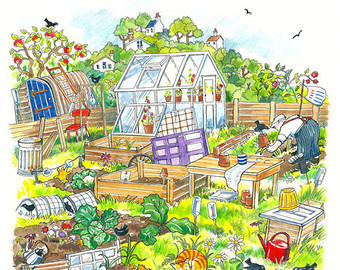
What you can do
With the whole Country suffering from a shortage of allotments here are some tips you can follow with the hope to getting a new allotment site set up.
Did you know that you do not need planning permission to set up allotments on agricultural land “Planning permission is not required for allotments, if the previous user of the land was an agricultural user, within the provisions of sections 55 subsection (2) paragraph (e) and 336 Town and Country Planning Act 1990.”
1. Get together a group of at least 6 individuals who want an allotment and who are registered on the electoral roll.
2. Find if you can a plot of land you think will be suitable for an allotment site.
3. Take your proposals to the Council, either arrange a meeting or write a letter. If six resident Council tax payers, or palimentary electors, each write in to state that such a need exists and each apply for allotments, then it is the duty of the council to ‘take proceedings’. This is a demoratic way of bringing the Section 23 rule to the notice of the council.
Section 23 of the Small Holdings and Allotments act 1908 states ‘that if allotment authorities ‘are of the opinion that there is a demand for allotments…..in the borough, district or parish the Council shall provide a sufficient number of allotments to persons…resident in the borough, district or parish and desiring the same’. In determining demand an authority must take into consideration ‘a representation in writing by any six registered parliamentary electors or rate payers’.
This is one of the very few duties placed specifically on Parishes (and Town Councils) by law. A prospective tenant could, if this duty is not carried out, seek a mandatory order under the Civil Procedure Rules.
With the huge number of people on waiting lists right across the country, how can councils argue that the demand is not there.
Section 25 of this act gives a local authority the power to compulsory purchase or lease land for allotments if land cannot be acquired by private agreement.
4. Join Us there is safety in numbers, larger groups of people have a larger voice and are therefore harder to ignore! SWCAA will be shaped by the needs and responses of its network of Friends who will, we hope, soon be able to provide intelligence in every locality and champion our cause.
The Small holdings and Allotments act of 1925, Section 3 specified that when a local authority is preparing a town-planning scheme, it must ‘consider what provisions ought to be included therein for the reservation of land for allotments.’ This provision was repealed by the Town and Country Planning Act 1947. (This Act was intended to facilitate the acquisition and maintenance of allotments, and to make further provision for the security of tenure of tenants of allotments)
Planning Policy Note 17 updates this by making it a duty to include green space and recreational areas in all local plans, and states that this duty includes planning provision for allotments. We believe this is not being put into practice as often as it should be.
The numbers of allotment plots across the country has been rapidly declining for some years which is bad news, especially as allotment gardening has taken off again in a big way. Councils are forced to consider alternative uses for sites, especially those that have been neglected. Allotments can play a big part in the fight to preserve our environment; they are important Green spaces which need to be protected. All manner of wildlife can be found on the allotment from frogs, toads, newts and slow worms to field mice, hedgehogs and many different species of birds and insects. But allotment sites are under threat as never before. When allotments disappear, often wildlife disappears with them and these precious habitats are lost forever. Many varieties of plants thrive on these sites, which contribute to the bio-diversity of the area and they also provide vital habitats for many species. Many good allotment sites have special areas which are left virtually untouched allowing wildlife to thrive.
All is not lost there are things that can be done to reverse this ever increasing problem and your support is vital.